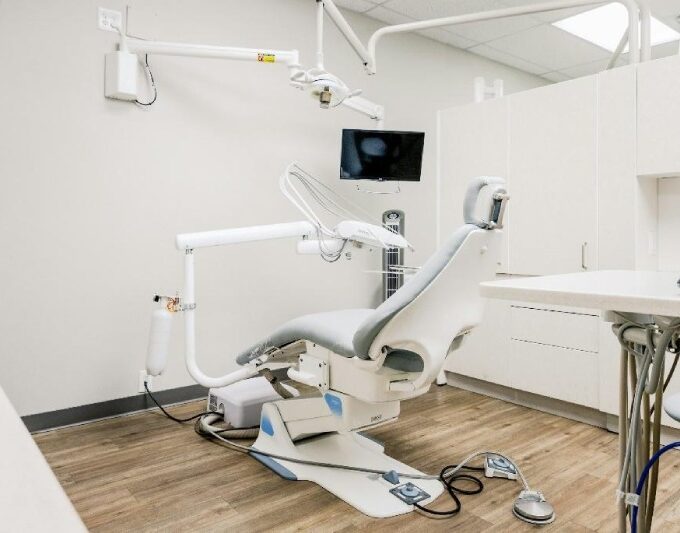When it comes to restoring missing teeth, the choice between dental implants and traditional dentures can be overwhelming. Both options aim to enhance your smile and improve oral function, but they come with distinct advantages and considerations. This article will guide you through the key differences, helping you make an informed decision based on your lifestyle, oral health, and personal preferences. Whether you’re looking for a permanent solution or a more affordable, removable option, understanding the pros and cons of each can help you determine which is right for you.
1. Understanding Dental Implants: A Permanent Solution
Dental implants are a popular choice for individuals seeking a long-term solution to missing teeth. The process involves surgically inserting a titanium post into your jawbone, which then acts as a replacement for the tooth root. When the implant integrates with the bone, a crown is attached to the post, mimicking the appearance and function of a natural tooth. The stability and durability of dental implants make them an excellent choice for those looking for a permanent solution. Unlike dentures, implants do not slip or shift, allowing you to eat, speak, and smile confidently without worrying about discomfort or embarrassment.
2. Comfort and Fit: How Do They Compare?
Comfort is a crucial factor when choosing between dental implants and traditional dentures. Dental implants offer a more natural feel, as they are anchored directly into the jawbone, providing stability similar to that of natural teeth. On the other hand, traditional dentures can sometimes cause irritation or discomfort, especially if they do not fit properly. Dr. Tiffany Kuang often recommends dental implants over dentures because, over time, your jawbone may shrink, leading to a less secure fit for dentures. This can result in slipping or difficulty eating certain foods. Dental implants, however, do not require adjustments and maintain their fit over time, offering a more comfortable and hassle-free experience.
3. Maintenance and Care: What to Expect
Both dental implants and traditional dentures require regular maintenance to ensure longevity and oral health. Dental implants are relatively low-maintenance, as they only require the same care as natural teeth—brushing, flossing, and regular dental check-ups. Since they are permanent, you don’t have to worry about removing them for cleaning or soaking them overnight. Traditional dentures, however, require more attention. You need to remove them daily for cleaning and soak them in a denture cleaner to maintain hygiene. Additionally, regular visits to the dentist are necessary for adjustments to ensure a proper fit and avoid potential issues like gum irritation or infections.
4. Longevity and Durability: Which Lasts Longer?
When it comes to longevity, dental implants typically outlast traditional dentures by a significant margin. With proper care, dental implants can last a lifetime, making them a worthy investment for those seeking a long-term solution. The titanium posts used in implants are highly durable and resistant to decay, unlike natural teeth. However, the crowns attached to the implants may need to be replaced every 15 to 20 years due to wear and tear. Traditional dentures, on the other hand, generally last about 5 to 8 years before needing replacement. Over time, the fit of dentures may change due to bone loss, requiring adjustments or new sets to maintain comfort and functionality.
5. Impact on Oral Health: Implants vs. Dentures
Your choice between dental implants and traditional dentures can significantly affect your oral health. Dental implants help preserve jawbone density because the titanium post stimulates the bone in a manner similar to natural tooth roots. This prevents the bone loss typically associated with missing teeth, which can lead to a sunken facial appearance over time. Additionally, implants do not affect neighboring teeth; they stand alone without requiring any modifications to adjacent teeth, unlike bridges that rely on the support of surrounding teeth. In contrast, traditional dentures do not offer these benefits. Over time, wearing dentures may accelerate bone loss in the jaw, as they do not provide the necessary stimulation to the bone. This can result in changes to your facial structure and require ongoing adjustments to your dentures.
6. Aesthetics: Achieving a Natural Look
Aesthetics play a significant role in deciding between dental implants and traditional dentures. Dental implants are renowned for their natural appearance. The crowns are custom-made to match the color, size, and shape of your surrounding teeth, creating a seamless and natural look. Because they are anchored securely in the jaw, implants also maintain the natural contours of your face, preventing the sagging or sunken appearance that can occur with tooth loss. On the other hand, traditional dentures, while they have improved significantly in appearance over the years, may not offer the same level of naturalness. Dentures can sometimes appear bulkier and may not mimic the look of natural teeth as closely as implants.
7. Eating and Speaking: Practical Considerations
The ability to eat and speak comfortably is a crucial consideration when choosing between dental implants and traditional dentures. Dental implants function almost identically to natural teeth, allowing you to enjoy your favorite foods without restriction. They provide the strength and stability needed to chew tough or sticky foods that might be challenging with dentures. Additionally, because implants are fixed in place, they do not shift or move, ensuring clear and confident speech. In contrast, traditional dentures may pose some challenges. They can slip or shift while eating or speaking, leading to discomfort or difficulty with certain foods and sounds. Over time, you may adapt to these challenges, but dental implants offer a more convenient and reliable solution.
Choosing between dental implants and traditional dentures depends on various factors, including your oral health, aesthetic preferences, lifestyle, and budget. Dental implants offer a long-lasting, natural-looking solution that closely mimics natural teeth, while traditional dentures do not. Understanding the pros and cons of each option can help you make the best decision for your unique needs. Consulting with a dental professional can provide personalized advice, ensuring you choose the solution that best fits your oral health goals and lifestyle.













